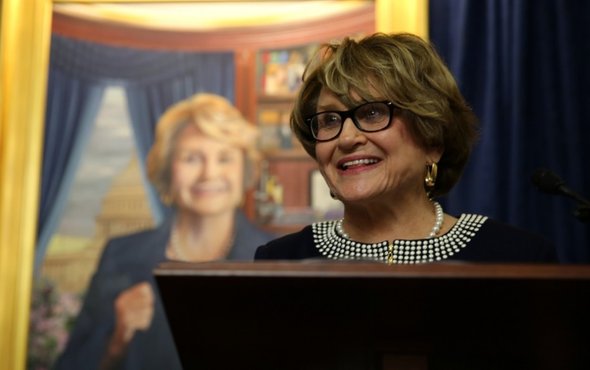(单词翻译:单击)
听力文本
This is Scientific American — 60-Second Science. I'm Steve Mirsky.
"Legislation to restrict the current overuse, I would say abuse, of antibiotics by farmers who raise livestock for human consumption."
Louise Slaughter, member of Congress from upstate New York, in 2009 on the floor of the House. Slaughter died March 16th. She was 88, and the oldest current member of Congress at the time of her death. More of her 2009 remarks:
"We have legislation that has strong and growing numbers of supporters who, like me, worry that the use of non-therapeutic antibiotics in our food supply poses an enormous and growing health risk for all Americans. And I hope all my colleagues...will be with us when we take up the Preservation of Antibiotics for Medical Treatment Act."

Slaughter grew up in Kentucky and received a bachelor's degree in microbiology and a master's in public health, both from the University of Kentucky. She repeatedly introduced legislation to cut down the overuse of antibiotics to promote animal growth, a factor in driving the development of antibiotic-resistant disease. Maryn McKenna talked to me about Slaughter last fall when McKenna's book Big Chicken came out:
MM: "Every term she brings forth a bill that is known as PAMTA, the Preservation of Antibiotics for Medical Treatment Act, that would remove from agriculture any antibiotic that is also used in human medicine. And every year the bill doesn't even get as far as hearings. And every year she brings it back again. She is indefatigable."
Despite the failure to pass the legislation, Slaughter's attention to the issue played a role in the decision by various agricultural enterprises to voluntarily cut their use of nonveterinary antibiotics in recent years. You can hear more about that development on the podcast with McKenna on the Scientific American Web site.
Slaughter proposed additional legislation to protect the food supply in general. She was the driving force behind the 2008 Genetic Information Nondiscrimination Act, which prevents insurance companies and employers from using genetic predispositions to discriminate. She was also a leader behind the 1994 passage of the Violence against Women Act, which funded shelters and educational programs. She was in her 16th term in Congress when she died.
LS: "Let's start taking steps to make sure our food supply is safe as it can be."
For Scientific American — 60-Second Science. I'm Steve Mirsky.
参考译文
这里是科学美国人——60秒科学。我是史蒂夫·米尔斯基。
“对养殖供人食用牲畜的农民过度使用抗生素这一问题,我会说那是滥用,应该用立法来进行限制。”
这是来自纽约州北部地区的国会议员路易丝·斯劳特于2009年在众议院发表讲话时提出的观点。斯劳特于3月16日去世,享年88岁,去世前,她是国会年龄最大的现任议员。她在2009年的讲话中还提到:
“我们的立法拥有坚定的支持者,而且支持者人数在日益增加,他们和我一样,担心食物供应中的非治疗性抗生素会给所有美国人带来巨大且不断增加的健康威胁。我希望在我们讨论‘抗生素医学治疗保护法案'时,所有同僚都能支持我们。”
斯劳特在肯塔基州长大,她在肯塔基大学获得了微生物学士学位和公共卫生硕士学位。她曾多次她多次提出法案,希望减少抗生素的过度使用,这些抗生素会促进动物生长,这也是导致抗生素耐药性疾病不断增长的原因。去年秋天,玫琳·麦肯纳所著的书《大危鸡》出版时,她和我谈到了斯劳特。
玫琳·麦肯纳:“她在每届议员任期都会提出‘PAMTA'法案,即抗生素医学治疗保护法案,该法案禁止在农业中使用也用于人类药物中的抗生素。但是每年,她提出的法案甚至都没到听证阶段都就被否决了。而她每年都会重新提出这项法案。她就是如此坚持不懈。”
尽管斯劳特的提案未能通过,但她对抗生素问题的关注影响了多个农业企业的决策,这些企业近几年自愿减少了非兽用抗生素的使用。若想了解后续进展,大家可以在《科学美国人》官网上收听麦肯纳参与的播客节目。
斯劳特提议增加立法以从总体上保护食品供应。她是2008年通过的《基因信息不歧视条约》的推动者,该条约禁止保险公司和雇主利用基因倾向而区别对待其顾客和雇员。在斯劳特的带领下,《防止对妇女施暴法》在1994年获得通过,该法案为避难所和教育项目提供资金。她去世时,正在国会任职第16个任期。
路易丝·斯劳特:“让我们开始采取措施,尽可能确保我们食物供应的安全。”
谢谢大家收听科学美国人——60秒科学。我是史蒂夫·米尔斯基。
译文为可可英语翻译,未经授权请勿转载!
重点讲解
重点讲解:
1. take up 开始处理;讨论如何处理;
Dr Mahathir intends to take up the proposal with the prime minister.
马哈蒂尔博士打算和首相讨论这个提案。
2. cut down 削减;减少使用;
Car owners were asked to cut down travel.
要求车主们减少驾车出行的次数。
3. bring forth 提出;
He is not likely to bring forth any new suggestions for improving our work.
他提出改进工作新建议的可能性不大。
4. in general 总的来说;总体上来看;大体上;
Minerals in general are not nearly so well absorbed as other nutrients.
总体来说,矿物质远远不如其他营养成分好吸收。


